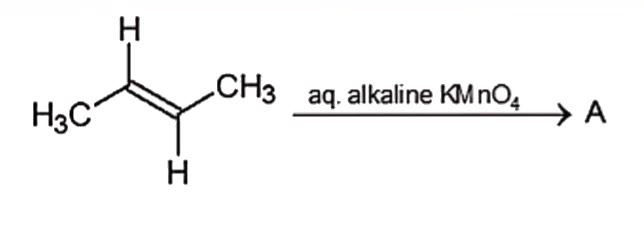Which of the following would be true for the reaction shown ?

A
The rate of the reaction depends only on the alkyl bromide concentration.
B
The rate of the reaction depends only on the methanol concentration.
C
The rate of the reaction depends on both the alkyl halide concentration and the methanol concentration.
D
The rate of the reaction depends on the concentration of neither reactant.
Text Solution
The correct Answer is:A
|
Topper's Solved these Questions
- IONIC REACTIONS (NUCLEOPHILIC SUBSTITUTION AND ELIMINATON REATIONS OF ALKYL HALIDES)BOOK - MS CHOUHANCHAPTER - IONIC REACTIONS (NUCLEOPHILIC SUBSTITUTION AND ELIMINATON REATIONS OF ALKYL HALIDES)EXERCISE - ADDITIONAL OBJECTIVE QUESTIONS (Integer Type )
1 Videos
- IONIC REACTIONS (NUCLEOPHILIC SUBSTITUTION AND ELIMINATON REATIONS OF ALKYL HALIDES)BOOK - MS CHOUHANCHAPTER - IONIC REACTIONS (NUCLEOPHILIC SUBSTITUTION AND ELIMINATON REATIONS OF ALKYL HALIDES)EXERCISE - ADDITIONAL OBJECTIVE QUESTIONS (Matrix Match Type )
2 Videos
- IONIC REACTIONS (NUCLEOPHILIC SUBSTITUTION AND ELIMINATON REATIONS OF ALKYL HALIDES)BOOK - MS CHOUHANCHAPTER - IONIC REACTIONS (NUCLEOPHILIC SUBSTITUTION AND ELIMINATON REATIONS OF ALKYL HALIDES)EXERCISE - ADDITIONAL OBJECTIVE QUESTIONS (Matrix Match Type )
2 Videos
- HYDROCARBONS (ALKYNES)BOOK - MS CHOUHANCHAPTER - HYDROCARBONS (ALKYNES)EXERCISE - Level 1 (Q.1 To Q.30)
2 Videos
- IUPAC NAMEBOOK - MS CHOUHANCHAPTER - IUPAC NAMEEXERCISE - Level 1 (Q.1 To Q.30)
1 Videos
Similar Questions
Knowledge Check
Which of the following is always true for a reaction
AOrder is equal to molecularityBOrder is always different from molecularityCOrder and molecularity may be same or differentDMolecularity may be zero or fractionalWhich of the following are true for first order reaction?
At3/4=2t1/2Bt15/16=4t1/2Ct15/16=3t3/4Dt7/8=2t3/4Which of the following is true for order of a reaction?
AIt is eqaul to the sum of exponents of the molar concentration of the reactants in the rate equationBIt is always a whole numberCIt is never zeroDIt can be determined theoretically

Which one of the following is true about this reaction ?
View Solution
Which one of the following is true about this reaction ?
View SolutionWhich of the following are true for the first order reaction?
View SolutionWhich of the following os true for an elementary reaction ?
View SolutionWhich of the following is not true for SN1 reaction ?
View Solution
